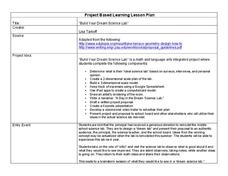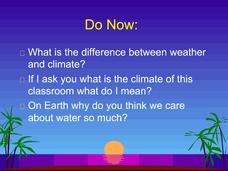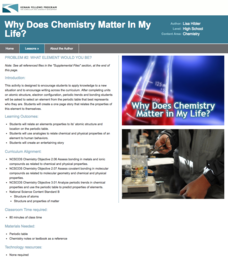Curated OER
What Makes a Plant a Plant?
For a plant unit in your biology curriculum, here is a slide show that bestows the basics of plant structure, reproduction, and classification. The information is general. The main point of the lesson is to highlight what characterizes...
Curated OER
Is Anyone Out There? Examining Astrobiology and the Value of SETI
Blow their minds with a lesson on the search for life outside of our planet! A brief video proposes the question of how to define life. A couple of articles investigate the possibility of alien existence. Finally, the class is divided...
Curated OER
What Should I Know about Respiration
How are kids supposed to know what to study for that cellular respiration test? With a study guide or reading guide like the one found here. With three pages of questions important to the understanding of respiration and the processes...
Curated OER
What Should I Know about Biosphere?
If your class is learning about the biosphere, you may find a study guide or reading guide helpful. Focusing on vocabulary, processes, and interactions, the Word document is easy to edit as needed to fit your needs. Another great...
Curated OER
What Should I Know About Photosynthesis
This four-page handout would work great as a reading guide or note-taking resource for teens learning about ATP, photosynthesis, the key scientists in the realm of photosynthesis, and more. It is designed to accompany a certain textbook,...
Curated OER
Lesson Idea: A Box Full of Science
Students analyze and study a shoe box of simple objects. They experience a homemade alternative to a company box of commercial kits for science. Each student creates their own shoe box of simple objects to share with their classmates.
Curated OER
Gravity: What is It?
Explore gravity, force, and mass as some of the natural forces in the universe. Each slide provides information and examples that describe each concept. Learners are encouraged to throw a basket ball and a bean bag into the air to...
Curated OER
Build Your Dream Science Lab
Would your ideal science lab be filled with bubbling beakers and zapping Tesla coils? Or would it contain state-of-the-art computer technology and data analysis? Dream big with an innovative lesson that connects math and language...
Berkshire Museum
Meet a Naturalist: Researching, Writing, Interviewing
Young scholars reach out into the community and learn about different environmental science careers in this inquiry-based instructional activity. Beginning with a short research assignment, children gain background knowledge about...
Cornell University
Garden Math
Young scientists must put their math caps on and figure out what fraction of each flower is in a raised flower bed. They must problem solve to simplify the fractions, and then graph the amount of flowers that are in different flower beds.
National Wildlife Federation
Yesterday: Our Energy Needs Over Time
How has our relationship to energy changed over time? An engaging exploration challenges learners to create a timeline showing human energy needs and uses over time. Scholars review what timelines are, choose a 50-year period in history...
Port Jefferson School District
Water and Climate
Dive into a lesson on the hydrosphere with this Powerpoint presentation. Building on prior knowledge of the water cycle, young scientists learn what happens to water after it falls as precipitation and explore the...
Cornell University
Wasps and Ladybugs
Can a good bug ever become a bad bug? An elementary entomology resource explores what to do when too many ladybugs or too many bees are in your home and can become a problem.
NOAA
Please Pass the Salt
Salinity is the focus of two experimenters that work to answer the question, How does salt change the physical properties of water? Super scientists compare the freezing rate of salt and fresh water, combine the two waters to...
Kenan Fellows
What Element Would You Be?
Primo Levi wrote a collection of short stories comparing his life from Italy to Auschwitz to elements in the periodic table. Pupils read an excerpt from his book and research the characteristics of various elements. Then, they make a...
Curated OER
Scientific Method Experiment: Factors Affecting How Ice Melts
Young scholars demonstrate the scientific method by conducting an ice cube melting experiment. They make predictions and observations, and conclude what factors make ice melt more slowly or quickly than normal.
Virginia Department of Education
DNA Structure, Nucleic Acids, and Proteins
What is in that double helix? Explain intricate concepts with a variety of creative activities in a instructional activity that incorporates multiple steps to cover DNA structure, nucleic acids, and proteins. Pupils explore the history...
College Board
AP® Computer Science A: Elevens Lab Student Guide
Looking for a project to use in an AP® Computer Science class? Engage learners with a simple solitaire game called Elevens. Through these activities, learners break down the task and write the code for a game. Sign in to your College...
New York State Department of Environmental Conservation
Adaptations – Designs for Survival
What's the difference between behavioral adaptations and physical adaptations? Learn about the various ways that organisms adapt to their environment with a worksheet about the creatures of the Hudson River.
University of Minnesota
Beautiful Brain: Do You See What I See?
Can art play tricks on your eyes, and can a still painting really appear to vibrate? The second lesson in a four-part series discusses the way our beautiful brains translate visual images. It highlights the style of optical art and...
Curated OER
Lesson Plan Outline for Rainbow Science
Young scientists study light reflection and refraction as they determine the critical angle, the rainbow angle, and color separation in rainbows. Teams record the data they collect in a shared spreadsheet and discuss results with the class.
Student Handouts
What's My GPA?
Here is an excellent, detailed one-page reference sheet to introduce students to what a grade point average (GPA) is and how to calculate their own.
Ventura County Air Pollution Control District
Effects of Global Warming
Your learners have probably heard of climate change, but do they really understand what it is? Study the history, details, and future implications of global warming and the greenhouse effect with a set of activities designed for an...
Curated OER
Cycling of Matter and Energy
These twenty various types of questions related to the cycling of matter and energy require students to match each definition in column 1 with the correct vocabulary term from column 2. Then, students explain what is being demonstrated...
Other popular searches
- What Is Science Important
- What Is Science Worksheets
- Science What Is Science
- What Is Science Fiction
- What Is Science Worhsheets
- What Is a Science Theory
- What Is Science Skills?
- What Is Science Florida
- Science What Is a Rock?























